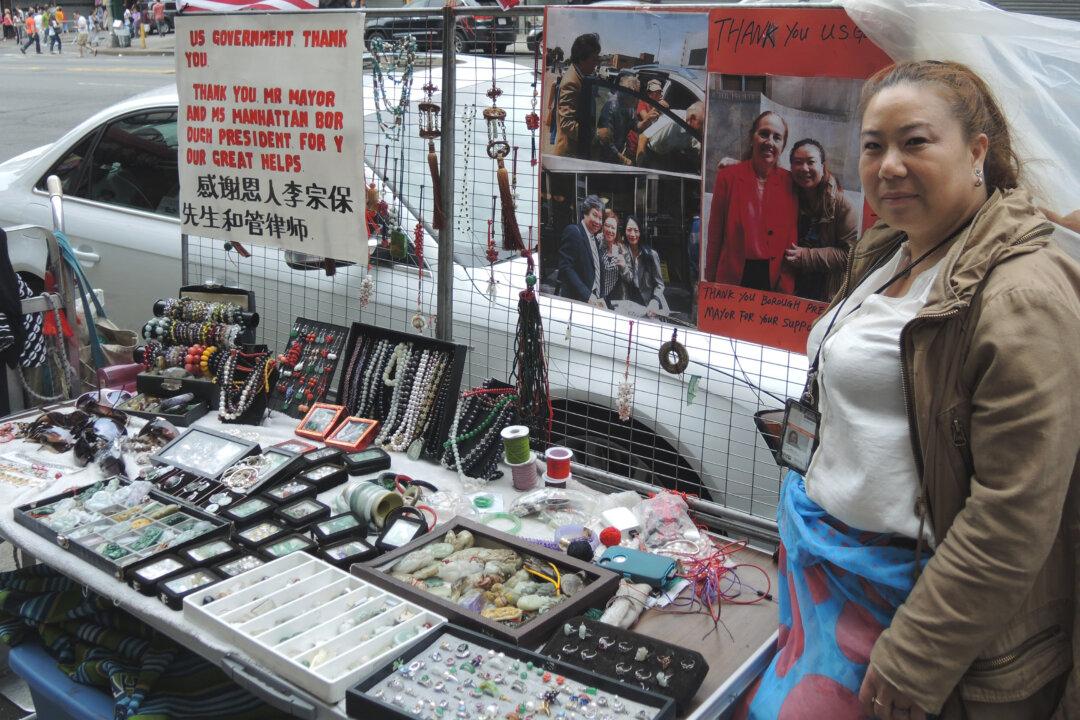NEW YORK—Relief might be on the way for city vendors who, until now, could not transfer their license to a family member. In the case of Chun Yin, it is just what the doctor ordered.
Yin’s husband Zhihui Zheng is a holder of a coveted general vendor license, and his street stall is the only source of income for the family of four.
But Zheng had a stroke in 2001 and was hospitalized; afterwards his diabetes worsened.
With high-blood pressure and swollen legs, he couldn’t make it to his vendor’s stall in Manhattan’s Chinatown, and it left Yin to provide for her two young sons alone.
Yin was arrested 11 times because the license is not in her name.
In June, Zheng was granted a temporary transfer, allowing Yin to take his place at the vendor’s stall. More significantly, she could go without worrying that she would be ticketed or arrested.
Proposed city legislation expected to be introduced on Thursday by Councilmember Margaret Chin will amend the city’s administrative code to allow vendors to transfer their license to someone in their family when they are ill or incapacitated.
When every penny of the hard-earned livelihood of a vendor is at stake, one day or more can be a meaningful difference in income.
Toil
Councilmember Chin says she has been working on the issue since at least 2010. But it was Zheng and Yin’s case that brought the issue home.
“I think it really started more than a year ago,” said Chin of helping the couple, from her City Hall office on Tuesday. “We were trying to figure out a way to help this vendor.”
They contacted the city’s Department of Consumer Affairs and others for help, and finally got the answer: transfer the license. That would take a new law, though.
Under the city’s current law, only a licensed vendor may sell at their stand. If someone is selling in their place, the police might ticket or jail them. For Chin, that goes against the American tradition of small businesses.
Chin also knows a lot of current vendors who she says desperately need the ability to transfer their license. Much like taking a sick day from an office job or leaving someone else in charge at the shop when you’re not feeling well, a transferable license would save already struggling vendors and their families from the trauma of repeated arrest and ticketing.
“We just hear stories after stories,” she said. “It’s a really simple, common-sense issue.”
Providing for the Public
Although Yin was arrested 11 times for trying to provide for her family, she bears no ill will towards them.
“People who have not experienced what I have gone through will have a hard time understanding how much I love America,” Yin said.
“If I were to sell from a stall in China, the [Chinese] police would have trashed my stall. There was no way the [Chinese police] would be polite to me.”
If she were in China, Yin added, there would be no way the government would have provided any aid to her husband when he was ill.
“My husband was once on the verge of dying, but saved by the hospital. If it were in China, none of the hospital would take him in without any money,” Yin said. “He would have died.”
“The U.S. government cured my husband, allowed my children to go to school, gave us food stamps, and cared about my family. I can fully appreciate that the United States is a democratic and free country,” Yin said.
“Providing care to people like us who do not have any power or money; I am truly grateful to the U.S. government.”
With additional reporting by Xiu Hua.





